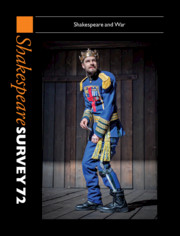Book contents
- Shakespeare Survey
- Shakespeare Survey
- Shakespeare Survey
- Copyright page
- Editor’s Note
- Contributors
- Contents
- Illustrations
- Henry V after the War on Terror
- Economies of Gunpowder and Ecologies of Peace: Accounting for Sustainability
- Shakespeare and Religious War: New Developments on the Italian Sources of Twelfth Night
- ‘Thou Laidst No Sieges to the Music-Room’: Anatomizing Wars, Staging Battles
- Shakespearian Narratives of War: Trauma, Repetition and Metaphor
- War Without Shakespeare: Reading Shakespearian Absence, 1642–1649
- Antic Dispositions: Shakespeare, War and Cabaret
- The Comedy of Hamlet in Nazi-Occupied Warsaw: An Exploration of Lubitsch’s To Be or Not to Be (1942)
- The Lion and the Lamb: Hamlet in London during World War II
- Dividing to Conquer or Joining the ReSisters: Shakespeare’s Lady Anne (and Woolf’s Three Guineas) in the Wake of #MeToo
- The Homeland of Coriolanus: War Homecomings between Shakespeare’s Stage and Current Complex TV
- Scholarly Method, Truth and Evidence in Shakespearian Textual Studies
- Beautiful Polecats: The Living and the Dead in Julius Caesar
- Ancient Aesthetics and Current Conflicts: Indian Rasa Theory and Vishal Bhardwaj’s Haider (2014)
- Failure to Thrive
- Tippett’s Tempest: Shakespeare in The Knot Garden
- Tautological Character: Troilus and Cressida and the Problems of Personation
- ‘Rude Wind’: King Lear – Canonicity versus Physicality
- Content but Also Unwell: Distributed Character and Language in The Merchant of Venice
- Autistic Culture, Shakespeare therapy and the Hunter Heartbeat Method
- The Senecan Tragedy of Feste in Twelfth Night
- Shakespeare Performances in England, 2018
- Professional Shakespeare Productions in the British Isles, January–December 2017
- The Year’s Contributions To Shakespeare Studies
- Abstracts of Articles in Shakespeare Survey 72
- Index
Tautological Character: Troilus and Cressida and the Problems of Personation
Published online by Cambridge University Press: 18 September 2019
- Shakespeare Survey
- Shakespeare Survey
- Shakespeare Survey
- Copyright page
- Editor’s Note
- Contributors
- Contents
- Illustrations
- Henry V after the War on Terror
- Economies of Gunpowder and Ecologies of Peace: Accounting for Sustainability
- Shakespeare and Religious War: New Developments on the Italian Sources of Twelfth Night
- ‘Thou Laidst No Sieges to the Music-Room’: Anatomizing Wars, Staging Battles
- Shakespearian Narratives of War: Trauma, Repetition and Metaphor
- War Without Shakespeare: Reading Shakespearian Absence, 1642–1649
- Antic Dispositions: Shakespeare, War and Cabaret
- The Comedy of Hamlet in Nazi-Occupied Warsaw: An Exploration of Lubitsch’s To Be or Not to Be (1942)
- The Lion and the Lamb: Hamlet in London during World War II
- Dividing to Conquer or Joining the ReSisters: Shakespeare’s Lady Anne (and Woolf’s Three Guineas) in the Wake of #MeToo
- The Homeland of Coriolanus: War Homecomings between Shakespeare’s Stage and Current Complex TV
- Scholarly Method, Truth and Evidence in Shakespearian Textual Studies
- Beautiful Polecats: The Living and the Dead in Julius Caesar
- Ancient Aesthetics and Current Conflicts: Indian Rasa Theory and Vishal Bhardwaj’s Haider (2014)
- Failure to Thrive
- Tippett’s Tempest: Shakespeare in The Knot Garden
- Tautological Character: Troilus and Cressida and the Problems of Personation
- ‘Rude Wind’: King Lear – Canonicity versus Physicality
- Content but Also Unwell: Distributed Character and Language in The Merchant of Venice
- Autistic Culture, Shakespeare therapy and the Hunter Heartbeat Method
- The Senecan Tragedy of Feste in Twelfth Night
- Shakespeare Performances in England, 2018
- Professional Shakespeare Productions in the British Isles, January–December 2017
- The Year’s Contributions To Shakespeare Studies
- Abstracts of Articles in Shakespeare Survey 72
- Index
Summary
In the first act of Troilus and Cressida, Aeneas pays a visit to the Greek camp, looking for a king whom he claims not to know by sight. ‘Is this great Agamemnon’s tent I pray you?’ he asks (1.3.215). A few lines later, he tries again: ‘How may / A stranger to those most imperial looks / Know them from eyes of other mortals?’(1.3.222–4). It is a timely question, one that introduces a vein of comic irony to what has been – to this point – a dourly serious scene, anchored by Ulysses’ famous account of the decline of ‘degree’. ‘The specialty of rule’, he had warned, ‘hath been neglected’, and now Aeneas had arrived to prove the point (1.3.77). It is not quite clear whether Aeneas’ uncertainty is genuine; Agamemnon, for one, is not convinced. The joke is on the Greek King either way: the implication of the question is that his ‘most imperial looks’ are not, in fact, particularly distinguished, or at least that they are indistinguishable from those of the ‘other mortals’ in the Greek tents. And if we take Aeneas seriously – if he is genuinely confused – the effect is even more unsettling: if ‘high and mighty Agamemnon’ (1.3.230) cannot be recognized, who in the play can?
- Type
- Chapter
- Information
- Shakespeare Survey 72 , pp. 219 - 233Publisher: Cambridge University PressPrint publication year: 2019

